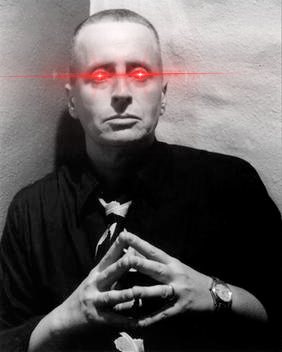It was a good read. Not at all what I expected. There really wasn’t any gender theory at all and no attempt justifying gender identity. It was just full throated support for all gender identities, which was nice.
I also found it really interesting how antiquated a lot of the language is after only two decades, but the message itself is at least as progressive as the conversations people are having now. There’s such an emphasis on transness outside of binary trans people.
I feel like this understanding of gender would really cut out a lot of the bullshit gatekeeping truscum arguments out. A lot of truscum look at enby or GNC people and say, “you’re just a man in a dress” to which I think Feinberg would reply, “Yes, and?” Men in dresses also have an outlawed gender expression which deserves defending. Considering how armed fascists keep showing up to drag events, I think this view has been vindicated.
I also find it interesting how s/he changes hir pronouns depending on the social context. To me, this level of fluidity acknowledges gender as a social manifestation as opposed to anything essential.
Anyway, I’d like to read more. I was turned to Marxism through history, so I’d like to read up on pre-modern queer history. When I’m arguing with people about gender, I always bring up the fact that gender expression has varied throughout history and there are lots of examples of gender outside of the binary; however, I don’t actually have specific examples that I am really familiar with.
Could anyone recommend a book that goes over non-cis gender identities throughout history and the roles they played? I’d really prefer a central source that covers a lot of cases as opposed to a deep discussion of a single one.
Thanks, comrades
It’s a great book. It is really impressive just how forward thinking it is. I guess I shouldn’t be surprised, Feinberg is the GOAT. I find a lot of the discussions in the book have an even more progressive outlook than many current conversations. I’ll hear queer people people splitting hairs about labels and arguing how gender works while Feinberg just lays down facts and is pretty much always correct.
find a lot of the discussions in the book have an even more progressive outlook than many current conversations. I’ll hear queer people people splitting hairs about labels and arguing how gender works while Feinberg just lays down facts and is pretty much always correct.

This is an awesome book. I’ve used it as a 101 resource for a couple people and it’s perfect for that. Like you said, it’s very accessible, it’s so human and compassionate, it’s easy to read in snippets, phenomenal.
Yeah, I found the “portrait” sections very compelling which is weird because I’m not usually into that kind of stuff
S/he wrote a pamphlet on it, don’t remember the name though. Although I’ve heard there’s some slight problems with its history but I wouldn’t know. I thought it was a good read.
So the pinned post doing a gender survey made me think deeply about this. This is how I answered:
I guess I say no here. I present masc, and definitely lean that way, but I’ve come to realize that a lot more people are gender fluid than think they are, myself included. It’s all kind of silly how we get drilled into our heads what we are supposed to be and how we’re supposed to act, when we are all our own unique individuals.
Like I am totally fine using he/him the rest of my life and and have no strong desire to identify as anything else. I did a little reading and I guess “demiguy” comes closest? My issue is I don’t think AMAB taking an introspective view and seeing that not all of society’s masculine norms apply to him should need a definition. Defining it like that just feels like an extension of the binary idea of gender. It’s a weird feeling.
I guess I’m asking if that book you read has any answers or perspectives on my thoughts, or if the way I feel about even needs answers?
Lol I literally just responded to you in that thread as I got this notification.
Like I am totally fine using he/him the rest of my life and and have no strong desire to identify as anything else. I did a little reading and I guess “demiguy” comes closest? My issue is I don’t think AMAB taking an introspective view and seeing that not all of society’s masculine norms apply to him should need a definition. Defining it like that just feels like an extension of the binary idea of gender. It’s a weird feeling I guess.
So, I can tell you that this is an opinion I had like a year or two ago down to the word, including identifying as demi.
Have you read trans liberation? It was pretty eye opening for me. It might even validate your current experience.
Yeah haha I saw that I was trying to figure out what to say. We posted within like 30 sec of each other.
I guess even labelling it gender fluid or gender diverse doesn’t feel to do it justice, since I guess I reject the idea that the way I feel is “feminine” as much as its just not “masculine”. Is that just my ingrained sense of not wanting to identify as feminine? Or is agender just so hard to describe with the way we’ve been taught?
I think I’m gonna have to read it or this is gonna bother me
since I guess I reject the idea that the way I feel is “feminine” as much as its just not “masculine”
Hah, yeah. I think we share a lot of the same experience and views on this. I’ve worn women’s clothing for years now, but I only refer to them as women’s clothing because people know what I’m talking about when I say women’s clothing. When I refer to them, they’re just “my clothes.” I don’t think they have a gender. I revoke the idea that skirts or dresses are inherently feminine. I wouldn’t ever call myself a crossdresser.
HOWEVER, there are times when masculine and feminine categories have meaning for how I personally express myself. I guess that’s where the fluidity comes in.
Is that just my ingrained sense of not wanting to identify as feminine?
Maybe. When I was really questioning, it kicked up a lot internalized misogyny, homophobia, transphobia, etc.
Or maybe you really are just agender. Don’t know, only you can reflect on that one.
Good luck with the reading! You can find it free on libgen. Feel free to DM me if you wanna chat about it.
Yeah sorry I didn’t mean to come at you like you have all the answers for how I feel, I appreciate the feedback. And thanks for making this post at such the perfect time for me to find it.
No need to apologize

Happy to help you on your journey

Could anyone recommend a book that goes over non-cis gender identities throughout history and the roles they played?
No, but I’d strongly encourage you to send an email to Michaela Appletova because she’s an academic who is interested in history and gender identities.
Your question isn’t squarely in her wheelhouse but academics know academics and they move in the same circles where they share overlapping areas of interest so she would probably have some good names of authors or books to point you towards.Academics, especially historians, are generally massive nerds and when someone is polite and shares their interest they tend to be extremely enthusiastic about the whole thing particularly when it’s someone from the general public. (It can feel a little bit claustrophobic and insular being stuck in a university office toiling away for years or decades at your subjects of interest and wondering whether you’re just shouting/typing into a void or—worse yet—to some little self-congratulatory academic circlejerk.)
Here’s her info including her email:
https://history.wfu.edu/people/appeltm
I guess I’d encourage you to keep the email pretty brief and don’t feel discouraged if it takes a few weeks or longer to get a reply. Often academics are overloaded with stuff like deadlines for marking work or submitting things for conferences and stuff. Or they’ll be reaching out to their contacts to get the best info to you.




